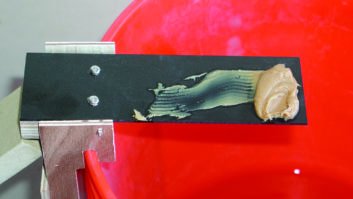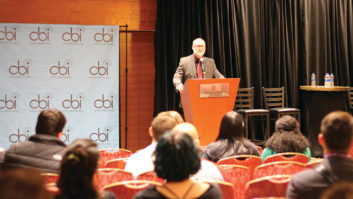Two Views on the broadcast indecency brouhaha.
Janet Jackson’s breast exposure was the spark that lit the broadcast indecency controversy – a flame likely to continue burning until the fall elections. John King and John Crigler of the law firm Garvey Schubert Barer in Washington illuminate differences of opinion on the issue in this written exchange.
King: It’s an entertainment bonanza! Look what a Super Bowl flash of flesh hath wrought. Democrats and Republicans alike get a win-win election year issue on indecency. Broadcast executives take heat in Hill hearings to jack fines up to half a million dollars. At Clear Channel, Bubba, Howard Stern and others are canned. The FCC says you’re damn right that “f****** brilliant” is indecent. But does that get us anywhere?
Crigler: We are getting a lot more than we bargained for. The Super Bowl “fumble,” as Sen. McCain likes to call it, is producing significant changes in the regulation of indecency. Congress may not only give the FCC authority to increase fines for indecent broadcast programs, but push the commission to extend its regulation of indecent material to other media, such as cable and satellite TV, that have not previously been subject to content regulation.
The FCC is also thinking hard about new ways to use its existing authority to “crack down” on broadcast indecency. The “flash of flesh” that lasted less than a second may have regulatory implications that last for years.
King: But you can’t blame broadcasters for thinking that this, too, shall pass, since enforcement has been so sparse and selective. As my brother says about speeding, “Why worry? There are too many cars and not enough cops.”
How is the FCC complaints staff of 20 lawyers going to process complaints that number in the hundreds of thousands for the Super Bowl halftime show alone?
Crigler: The agency is out to prove you wrong. It’s true that the commission responds to complaints, and in the past this complaint-driven approach resulted in a good deal of inefficiency. The great majority of complaints were never investigated.
Now “indecency” is a hot political topic; it’s easy to record programs; and even easier to e-mail a complaint to the FCC. Special interest groups, such as the Parents Television Council, are organized to facilitate the complaint process, and seem to be doing a remarkable job.
Within days after the Super Bowl incident, the FCC received more than 200,000 complaints – a record number. Complaints are now unlikely to fall on deaf ears.
The FCC is eager to regulate. The commission home page provides detailed instructions for filing an indecency complaint.
In the past, most complaints were dismissed because they did not satisfy technical requirements for establishing the likelihood of a violation. For example, the complaint may not have identified the station involved, the time of day when the allegedly indecent program aired, or attached a tape or transcript of the program.
Expect to see the agency become much more “consumer friendly.” Complainants may be required to make only a minimal showing, and broadcasters forced to prove that they did not air indecent material.
King: Or convince the FCC that what they did air is not indecent. That’s what bogs down the entire process. Many broadcasters who may find themselves in an unwilling but competitive “race to the bottom” must decide when entertainment turns into raunch, and when raunchy becomes indecent.
The FCC did not make that decision any easier when it adopted its definition of indecency: “language or material that, in context, depicts or describes, in terms patently offensive as measured by contemporary community broadcast standards for the broadcast medium, sexual or excretory organs or activities.”
How would you analyze the flash of a bejeweled breast against that standard? FCC staff decisions more often confuse rather than clarify.
In a future case, when a multi-million-dollar fine may be at stake, an indecency dispute may wind up in the courts and take years to resolve.
Crigler: I’m not sure whether you’re getting all excited over Janet Jackson’s anatomy or the case it will take you years to resolve, but I certainly agree that there is something ridiculous about FCC indecency decisions.
Anyone interested in understanding the indecency standard has to ponder such illuminating decisions as whether “pissed off” is now part of our vernacular or an offensive reference to bodily fluids, whether “crap” any longer denotes excretion and whether the f-word is an adjective or a noun.
But you know as well as I do that the commission is going to say – as it already has said in many rulings – that there’s nothing at all “vague” about a standard that punishes broadcasters only for material that is “patently offensive.” The agency will point to its 2001 Policy Statement that establishes an elaborate analytic approach for determining whether a particular program is indecent.
Apply this two-tiered, mutlti-factor legal analysis to the flash of a bejeweled breast, and you’ll have your answer. The process may be ridiculous, but what’s vague about it?
King: Take one part broadcast program, add one policy statement, sift, divide into offensive and inoffensive portions (chaff and wheat, we might say), and simmer on the brain for 30 minutes at 98.6 degrees. It’s a perfect lawyer’s recipe in a perfect world.
In practice, it’s as amorphous as an English fog. Whose “contemporary community broadcast standards” are we talking about? The FCC’s? Does the agency apply differing contemporary community broadcast standards whether a complaint comes from Des Moines, Denver or Dallas?
Is what may be indecent in Newport News acceptable in Newport Beach? Or is the entire United States the “contemporary community”?
Does “in context” take literary merit into account? Would the broadcast of a Lenny Bruce monologue or a reading from “Lady Chatterley’s Lover” be indecent?
The perpetual challenge the government will always face in ruling on issues involving social mores is that one person’s artistic salsa dance is another’s wicked and erotic, er, crap.
Crigler: Now we’re getting somewhere, although I still don’t think “vagueness” is the problem.
The indecency policy is based on “contemporary standards for the broadcast medium.” Amazingly enough, these standards have nothing whatsoever to do with the values of any particular community, or any actual listener or viewer.
They are based on what, in the FCC’s view, is offensive to a mythical, “average” person. Behind what you characterize as an English fog is power that is anything but amorphous. Not to be too subtle about it, indecent material is material that offends the sitting commissioners.
At any given time, this group may consist of intelligent and well-intentioned people, but they are nevertheless political appointees who primarily consult their own tastes in deciding what is offensive. Those tastes are unlikely to find redeeming value in low-brow or “popular” culture – a race to the bottom – or in high-brow works of recognized artistic merit – such works that may well not appeal to the “average” person.
As a result, the FCC’s indecency policy must constantly war with the First Amendment, which protects points of view that are not average. These voices include dynamic forces of cultural change and political dissent, the most creative impulses of our society.
A standard that empowers the agency to punish “offensive” speech may not be vague, but it is certainly arbitrary, since such a standard invests the power to determine what we hear and see not in the American public, but in government officials.
Go back to your own question: Do you really think the FCC would exonerate a broadcaster who aired Lenny Bruce or “Lady Chatterley’s Lover”? Does that power seem “amorphous”?
King: I love a good rhetorical question. I’ll return to the question I first posed: Does increasing fines for broadcasting indecency get us anywhere?
On the amount of fines and the rigorousness and extent of regulatory enforcement, clearly the bar has been moved. On the standard of review and clarity for broadcasters, your assessment is realistic: Indecent matter is what the commission says it is.
Crigler: The FCC is not only doling out bigger fines, but acting faster on complaints, so get set for more indecency rulings, if not clearer standards.
Reach the authors at [email protected] and [email protected]. Radio World welcomes other points of view to [email protected].












